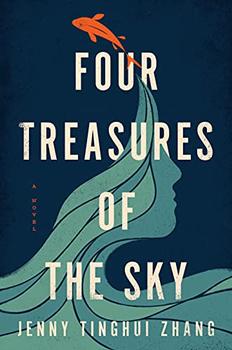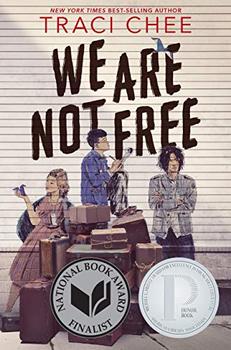Summary | Excerpt | Reviews | Beyond the book | Read-Alikes | Genres & Themes | Author Bio

A Novel
by Jenny Tinghui Zhang"…when our Chinese customers come asking for millet and green onions, buying licorice and cinnamon, I watch them with tenderness, following their movements. I miss you, and I do not even know you, I want to say to the miner, the launderer, the servant."
Lin Daiyu, the heroine of Jenny Tinghui Zhang's debut novel, Four Treasures of the Sky, ruminates on this beautiful observation as she works restocking a general store in Pierce, Idaho. The location — as well as the quote itself — is reflective of Daiyu's place in a culture of diaspora, as she has ended up thousands of miles from her seaside home in China. Pierce is just one of many stops on Daiyu's long journey trying to return home. Her deep, heart-wrenching love for the other Chinese immigrants around her is mirrored time and time again as she goes from San Francisco to Boise to Pierce in a world-spanning bildungsroman unlike any other I've read before.
To put it simply, a book like Four Treasures of the Sky is why I read historical fiction. The genre can come across as removed from the present, as irrelevant to the 21st-century world we know. But despite its 19th-century milieu, Zhang's novel is painfully germane to the present day. According to the Center for the Study of Hate and Extremism, there were overwhelmingly more hate crimes against Asians or Asian Americans in 2021 than 2020 in the United States. Despite huge leaps in civil rights and institutional diversity and inclusion, the fact is that many people of Asian descent in America continue to face discrimination and violence, just as Daiyu does in the wake of the Chinese Exclusion Act of 1882.
Daiyu faces unspeakable horrors throughout the book. When she is a child nearing her teenage years, her beloved parents disappear in the night, snatched by an unseeable, unknowable force; to keep Daiyu from the same fate, her grandmother sends her from their rural haven to the bustling city district of Zhifu, disguised as a boy for safety. There, she finds work in a calligraphy school, falling in love with the artistry and purpose granted to a calligrapher by their ink and brush (see Beyond the Book). She envisions becoming a master calligrapher like Master Wang, a teacher whom she idolizes and who serves as a personification of her conscience throughout the novel. Yet this bright future is not to be. Stolen on the streets of Zhifu, Daiyu is trafficked and sold into sex slavery in San Francisco after a harrowing trip across the Pacific.
Zhang depicts Daiyu's time in a San Francisco brothel delicately but forcefully — exactly as Daiyu wields her calligraphy brush. The stories of the young women among whom she lives and works are heartbreaking, and Zhang delivers feelings of real tension and urgency as Daiyu plans her escape. Yet even outside of the brothel walls, American dangers encroach in every corner. Though Daiyu returns to her guise of a young man in Idaho, there are many examples throughout the novel of men betraying or abusing her, adding to "the burden [of being] a girl."
Despite hardship unimaginable to many, the times when Daiyu finds genuine joy in Four Treasures of the Sky filled me with happiness. She is a character one cannot help but adore, when she giggles with a friend she makes in the brothel, or when she delights in celebrating the Mid-Autumn Festival with her found family. Her love of storytelling may be the best example of this joy, discovered even in a life marked by tragedy. A deep love of and respect for words is something Zhang shares with her heroine: They are both incredibly gifted wordsmiths who use their multilingualism to craft stories unconstrained by just one language. It is a pleasure and an honor to be able to read Daiyu's story — it is one that will not be forgotten.
![]() This review
first ran in the May 4, 2022
issue of BookBrowse Recommends.
This review
first ran in the May 4, 2022
issue of BookBrowse Recommends.

If you liked Four Treasures of the Sky, try these:

by Eve J. Chung
Published 2025
A propulsive, extraordinary novel about a mother and her daughters' harrowing escape to Taiwan as the Communist revolution sweeps through China, by debut author Eve J. Chung, based on her family story.

by Traci Chee
Published 2022
"All around me, my friends are talking, joking, laughing. Outside is the camp, the barbed wire, the guard towers, the city, the country that hates us.
We are not free.
But we are not alone."
Our wisdom comes from our experience, and our experience comes from our foolishness
Click Here to find out who said this, as well as discovering other famous literary quotes!
Your guide toexceptional books
BookBrowse seeks out and recommends the best in contemporary fiction and nonfiction—books that not only engage and entertain but also deepen our understanding of ourselves and the world around us.